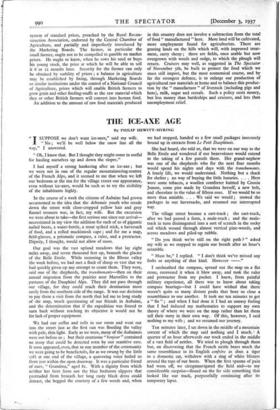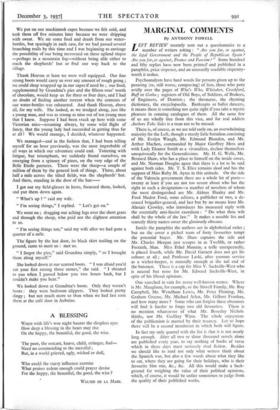THE ICE-AXE AGE
By PHILIP HEWITT-MYRING
" T SUPPOSE we don't want ice-axes," said my wife.
" No ; we'll be well below the snow line all the way," I answered.
" Oh, I know that. But I thought they might come in useful for hauling ourselves up and down the slopes."
I had myself a strong hankering after an ice-axe ; but we were not in one of the regular mountaineering centres of the French Alps, and it seemed to me that when we left our bedroom at the inn for the village street our appearance, even without ice-axes, would be such as to try the risibility of the inhabitants highly.
In the course of a week the citizens of Aubaine had grown accustomed to the idea that the debonair youth who strode down the street with close-cropped yellow hair and grey flannel trousers was, in fact, my wife. But the excursion we were about to take—the first serious one since our arrival— necessitated in my view the addition for each of us of gigantic nailed boots, a water-bottle, a stout spiked stick, a haversack of food, and a rolled mackintosh cape ; and for me a map, field-glasses, a prismatic compass, a ruler, and a protractor. Dignity, I thought, would not allow of more.
Our goal was the vast upland meadows that lay eight miles away, and seven thousand feet up, beneath the glacier of the Belle Etoile. While motoring in the Rhone valley the week before, we had met a flock of sheep so vast that we had quickly given up any attempt to count them. They were, said one of the shepherds, the transhumants—then on their annual migration from the prairies near Marseilles to the pastures of the Dauphine Alps. They did not pass through our village, for they could reach their destination more easily from the southern side of the range. It was our decision to pay them a visit from the north that led me to long study of the map, much questioning of our friends in Aubaine, and the determination that if the expedition was forced to turn back without reaching its objective it would not be for lack of proper equipment.
We had our coffee and rolls in our room and went out into the street just as the first sun was flooding the valley with pale, thin light. Early as we were, many of the Aubainois were out before us ; but their courteous "bonjour" contained no irony that could be detected even by our sensitive ears. It soon appeared, even, that to one member of the community we were going to be benefactors, for as we swung by the little café at one end of the village, a quavering voice hailed us from just within the open doorway. It was a particular friend of ours, " Grandma," aged 81. With a dignity from which neither her bent form nor the blue bedroom slippers that protruded from beneath her long rusty black dress could detract, she begged the courtesy of a few words and, when we had stopped, handed us a few small packages insecurely bound up in extracts from Le Petit Dauphinois.
She had heard, she told us, that we were on our way to the Belle Etoile and wondered if our benevolence would extend to the taking of a few parcels there. Her grand-nephew was one of the shepherds who for the next four months would spend his nights and days with the transhumants. A lonely life, we would understand. Nothing but a shack for shelter ; no way of buying the little luxuries. . . . Here were some tobacco, a woollen comforter knitted by Cousin Jeanne, some pies made by Grandma herself, a new belt, and chocolate to the value of fifteen sous. If we would be so more than amiable. . . . We said we would ; stowed the packages in our haversacks, and resumed our interrupted way.
The village street became a cart-track ; the cart-track, after we had passed a farm, a mule-track ; and the mule- track in turn disintegrated into a sort of scratch in the rocky soil which wound through almost vertical pine-woods, and across meadows and piled-up rubble.
" Do you think we're still on the right path ? " asked my wife as we stopped to regain our breath after an hour's scramble.
" Must be," I replied. " I don't think we've missed any forks or anything of that kind. However —.,3 I unsheathed the compass, spread out the map on a flat stone, recovered it when it blew away, and took the ruler and protractor from my pocket. I knew, from painful military experience, all there was to know about taking compass bearings—but I could have wished that there weren't quite so many distant peaks that bore so close a resemblance to one another. It took me ten minutes to get a " fix " ; and when I had done it I had an uneasy feeling that I had induced my mathematics to support my own theory of where we were on the map rather than let them tell their story in their own way. Of this, however, I said nothing to my wife ; and we resumed our journey.
Ten minutes later, I sat down in the middle of a mountain Torrent of which the map said nothing and I much. A quarter of an hour afterwards our track ended in the middle of a vast field of nettles. We tried to plough through them but, on discovering that the French nettle bears much the same resemblance to its English confrere as does a tiger to a domestic cat, withdrew with a ring of white blisters around the tops of our boots. When the first spasms of pain had worn off, we circumnavigated the field and—to my considerable surprise—found on the far side something that looked like our track, purposefully continuing after its temporary lapse. We put on our mackintosh capes because we felt cold, and took them off five minutes later because we were dripping with sweat. We ate some food and drank from our water- bottles, but sparingly in each case, for we had passed several branching trails by this time and I was beginning to envisage the possibility of our being marooned on these upland slopes —perhaps in a mountain fog—without being able either to reach the shepherds' but or find our way back to the village.
Thank Heaven at least we were well equipped. Our fine strong boots would carry us over any amount of rough going ; we could sleep wrapped up in our capes if need be ; our food, supplemented by Grandnia's.pies and the fifteen sous' worth of chocolate, would keep us for three or four days, and I had no doubt of finding another torrent when the contents of our water-bottles was exhausted. And thank Heaven, above all, for my wife. She looked, as we trudged along, just like a young man, and was as strong as nine out of ten young men that I knew. Suppose I had been stuck up here with some Victorian miss—assuming always, by some wild flight of fancy, that the young lady had succeeded in getting thus far at all ! We would manage, I decided, whatever happened.
We managed—and in the. fashion that, I had been telling myself for an hour previously, was the most improbable of all ways in which our adventure could end. Tottering with fatigue, but triumphant, we suddenly found ourselves, on emerging from a spinney of pines, on the very edge of the Belle Etoik pastures. There were the sheep—a. couple of million of than by the general look of things. There, about half a inile across the tilted fields, was the shepherds' hut. And there, standing in the dooi of the hut— I got out my field-glasses in haste, -focussed them, looked, and put them down again.
" What's up ? " said my wife.
" I'm seeing things," I replied. " Let's get on."
We went on ; dragging our aching legs over the short grass and through the sheep, who paid not the slightest attention to us.
" I'm seeing things too," said my wife after we had gone a quarter of a mile.
The- figure by the but door, its black skirt trailing on the ground, came to meet us : met us.
" I forgot the pies," said Grandma- simply, " so I brought theni along myself" She looked down at our scarred boots. " I was afraid you'd cut your feet among those stones," she said. " I shouted to you when I passed below you two hours back, but I couldn't make you hear." • . .
We -looked down at Grandma's boots. Only they weren't boots : they were bedroom slippers.. They looked pretty dingy ; but not much more so than when we had last seen them at the café door in Aubaine.



























































 Previous page
Previous page